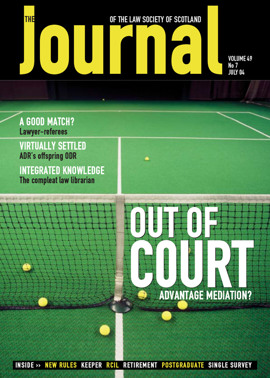Editorial: July 2020
What to do about jury trials? Of all the issues to have faced the legal profession due to COVID-19, this one is perhaps the most intractable.
The essentials are by now familiar. This month will see the first solemn trials in Scotland since March, but only initial exercises to test social distancing safeguards, each taking up two or three regular courtrooms plus other facilities. Meanwhile Lord Carloway, in a statement which praised the courts, and court users, for progress on other fronts, issued a stark warning that proposals put forward to facilitate more trials amounted only to “tinkering at the margins” of a backlog that could reach 3,000 cases by next March.
While not calling for juryless courts, the Lord President was clear that a “political solution” will be required. But the legal profession, and not just defence lawyers, appears united that the jury system is sacrosanct, if possibly with fewer jurors in less serious cases. “If we were just safeguarding our incomes, we would be pushing for judge-only courts,” is the message. “But the principle of keeping the system is more important.”
At the same time we cannot overlook that justice delayed may end up being justice denied. For accused, particularly if on remand, human rights issues will come into play sooner or later, and Holyrood cannot legislate those away. Complainers and others affected will also suffer the more if cases are left hanging.
Is the problem essentially COVID-related, or was there already a serious backlog due to longer term underfunding, as some allege? Either way, promises of extra money, if forthcoming, would not in themselves provide a solution. Logistical issues remain.
A proposal currently being promoted is “Nightingale courts”, borrowing from the name of the temporary hospitals set up to prevent the NHS being overrun at the height of the pandemic. Back in April the Scottish Government suggested the use of non-court buildings was unworkable due to practical difficulties, though in a paper in late May the Society was still arguing it should be explored further. It is regrettable that we appear to be no nearer a decision on what can be achieved, let alone any action on this front, when some additional provision is almost certain to be needed, whatever else is done.
It may turn out that, as with the schools, something like full capacity can be achieved sooner than was being predicted only recently. But even on the best case scenario for control of the virus, special measures will be needed for an extended period to tackle trials already pending. Unless a workable alternative is agreed, and urgently implemented, constitutional tradition may find itself in opposition to practical human rights.







